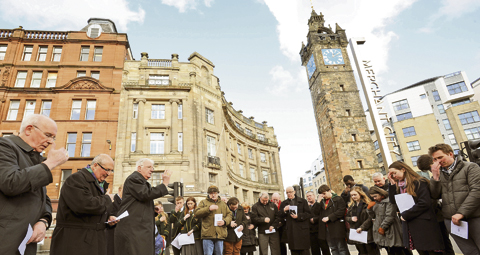BY Ian Dunn | March 13 2015 | ![]() 0 COMMENTS
0 COMMENTS ![]() print
print

Follow the example of St John Ogilvie
Publication Date: 2015-03-13
Pope Francis tells Scottish Christians celebrating martyred saint’s 400th anniversary that his life should act as an inspiration
Pope Francis has told the Catholics of Scotland that the example of St John Oglivie should inspire all to ‘a renewed faith, hope and charity, and zealous discipleship in the life of Christ.’
At Mass on Tuesday to mark the 400th anniversary of the martyrdom of St John Ogilvie, Archbishop Philip Tartaglia said the murdered saint is a symbol to all Christians of the need for religious freedom in the face of ‘persecution, sectarianism and brutality.’
The Glasgow Archbishop was joined for the Mass at St Andrew’s Cathedral by Cardinal Cormac Murphy-O’Connor, Archbishop Emeritus of Westminster, the Pope’s special envoy, Cardinal Sean Brady, Archbishop Emeritus of Armagh and Scottish bishops, priests and laity for a historic commemoration. Also present was the son and daughters of John Fagan—John, May and Margaret—the man whose miraculous healing paved the way for St John Ogilvie’s Canonisation.
Through his emissary, Cardinal Murphy -O’Connor, the Pope said he invited ‘all present to the fervent imitation of the life of Christ and the daily observance and divine commands by a specially devoted way of life in every way.’
“We pray that everyone mindful of the witness of St John Ogilvie and so many Christians should show fresh strength and zeal in wholehearted love for the Church of Christ and the Gospel and outstanding devotion of faith in today’s world,” the Pope’s message, delivered by Cardinal Murphy O’Connor, concluded.
Archbishop Tartaglia said so many had gathered to mark the anniversary because ‘John Ogilvie is our saint, our martyr, and we love him.’
Ahead of Tuesday night’s anniversary Mass of the saint’s death, Cardinal Murphy-O’Connor joined Cardinal Brady, Archbishop Tartaglia, clergy and pupils and staff from St Mungo’s Academy, St Aloysius College and Glasgow University Chaplaincy at Glasgow Cross (above), where St John Ogilvie died 400 years ago, for prayers.
After the 1560 Reformation, when Scotland broke with the Papacy, it became illegal to practice Catholicism. John Ogilvie, a Banffshire native, was educated and ordained a Jesuit priest in Europe in 1610. He returned to his native country in 1613, disguised as a horse trader named John Watson, but was arrested and tortured for celebrating Mass and the Sacraments with persecuted Catholics in and around Glasgow. He was hanged for high treason at Glasgow Cross on March 10 1615. He was 36. Though there ‘was no getting away’ from the fact St John Ogilive was a victim of ‘the spiritual and social and cultural storm of the Reformation in Scotland which very thoroughly purged almost all of this land of the Catholic Church,’ Archbishop Tartaglia said he should not be viewed strictly in that light.
“If the goal of the ecumenical movement, full visible communion, escapes us still and seems as far away as ever, there is a very real and effective ecumenism of friendship, prayer, witness and service which is a great good and which keeps the hope alive,” he said. “Oh—and an ecumenism of martyrdom too, because, as the Pope said, the martyrs belong to all Christians. So, even as the Catholic community rejoices for St John Ogilvie, I offer St John Ogilvie tonight as a martyr for all Scots Christians, so that we may together reap the rich harvest of faith and love which his blood has sown in our land.”
The full cathedral was lifted by the voices of the St Mungo Singers and civic society was represented by Lord Provost of Glasgow Sadie Docherty, the leader of Glasgow City Council Gordon Matheson and the Scottish Government’s Minister for Community, Fair Work, Skills and Training, Roseanna Cunningham.
— View the Scottish film on St John Ogilvie on YouTube, supported by the Society of Jesus at St Aloysius in Glasgow at: https://www.youtube.com/ watch?v=xRGbnOrPBbM&sns=fb
—This story ran in full in the March 13 edition print of the SCO, available in parishes.










